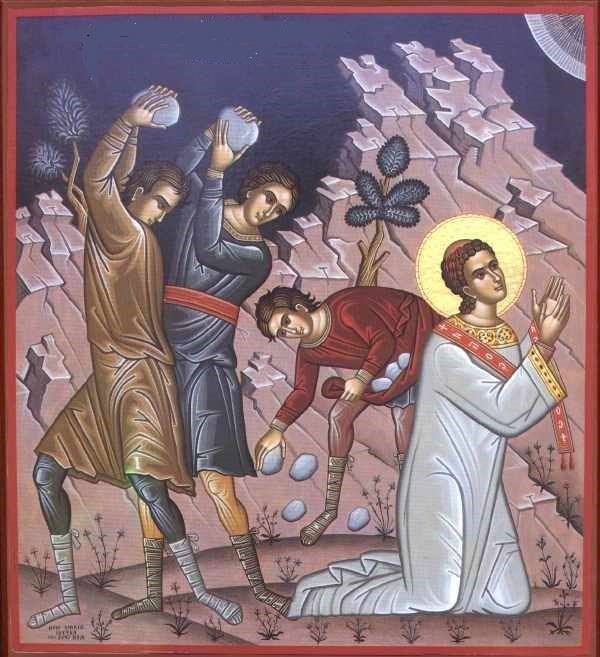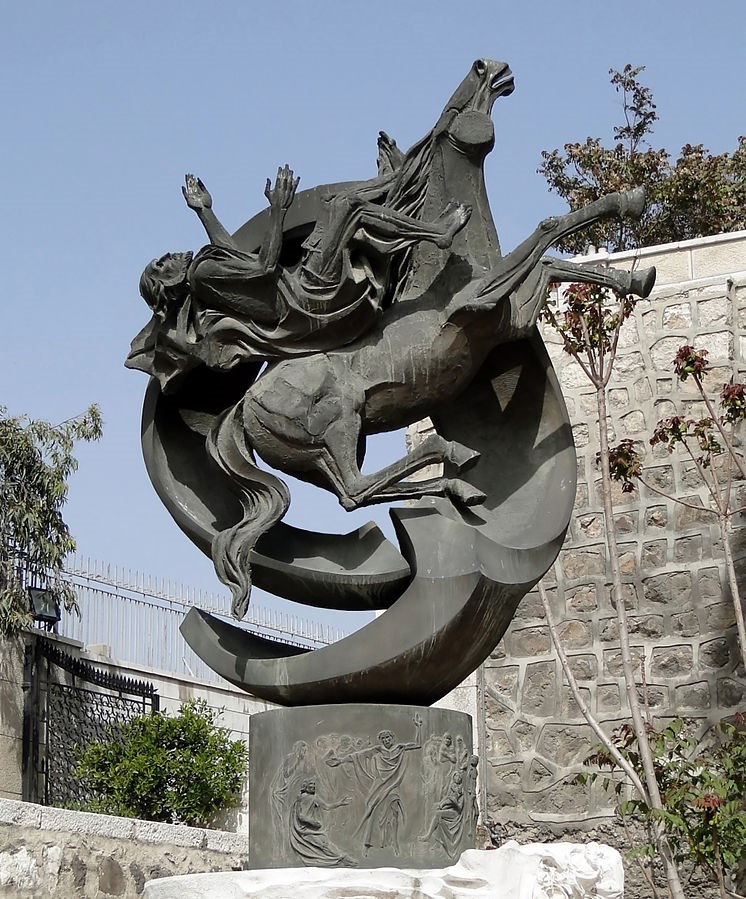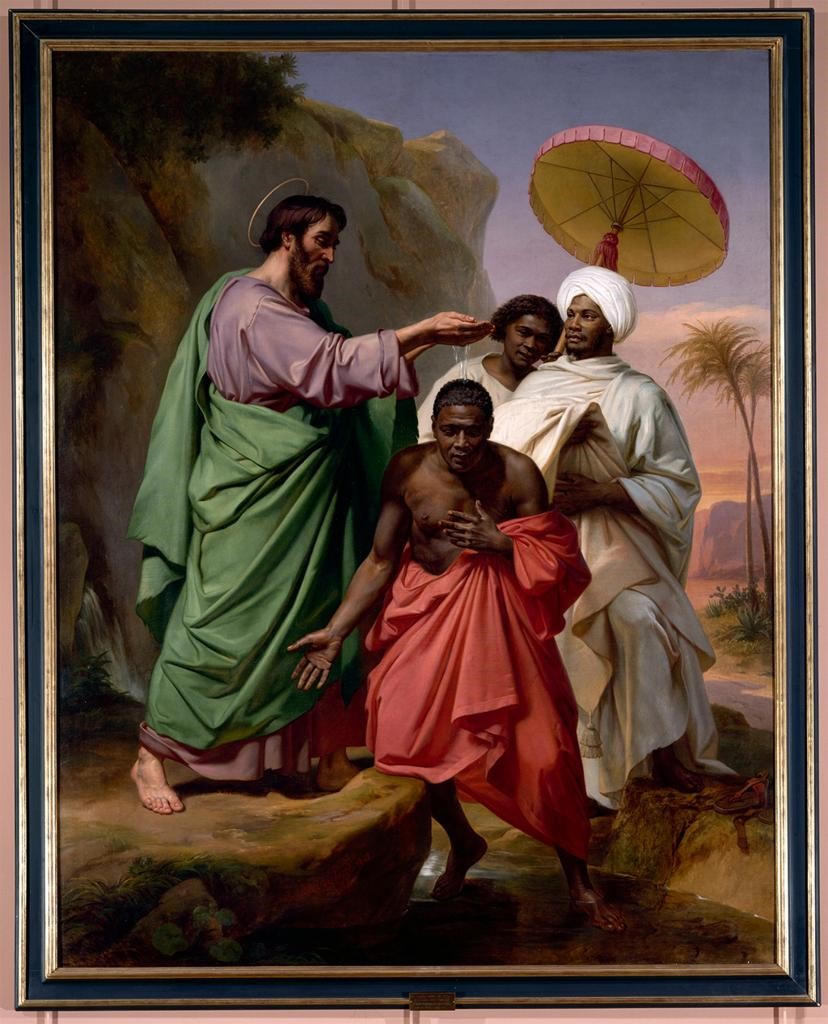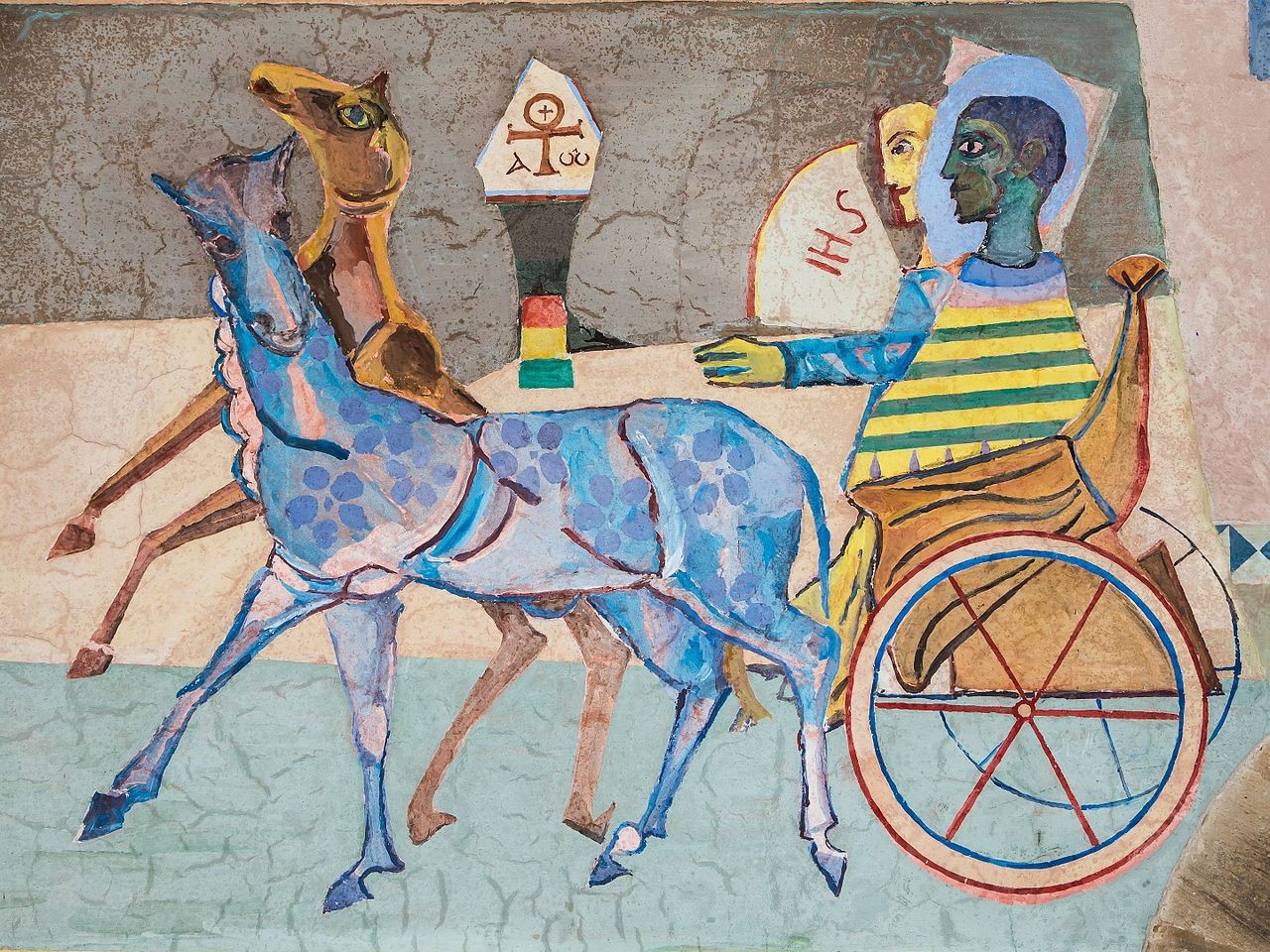Traducción de Gerardo Yvan Morales
La última vez, consideramos juntos la vida y las palabras del apóstol Pablo, quien encarnó a Cristo crucificado para los demás, ofreció un cuidado compasivo a los que sufrían y sentó las bases para que los cristianos que sufren se vean unidos a Cristo. Sigamos viajando con Pablo y los primeros creyentes en Cristo. Encontramos sus historias en los Hechos de los Apóstoles. Al igual que nosotros, se encontraron con obstáculos y, al igual que nosotros, tuvieron que hacer correcciones de rumbo, a veces importantes. ¿Cómo puede ayudarnos su ejemplo en nuestro camino de Cuaresma y en nuestro camino por la vida?
Comencemos con una figura llamada Stephen. Hechos 6 nos dice que él estaba “lleno de gracia y de poder, hacía grandes prodigios y señales entre el pueblo” (Hechos 6:8). Fue nombrado diácono para servir a otros miembros de la comunidad. Pero cuando estaba enseñando, nos dice Hechos, los que querían debatir con él “no pudieron resistir la sabiduría y el Espíritu con que hablaba”, por lo que tramaron acusarlo de blasfemia (Hechos 6:10). Fue condenado a muerte apedreándolo. Imagínese el momento: ¡había participado en actos de servicio, dado testimonio sobre la fe y ofrecido un discurso en defensa de la enseñanza cristiana! Sin embargo, fue sometido a una muerte cruel.
Last time, we considered together the life and words of the Apostle Paul, who embodied Christ crucified for others, offered compassionate care to those who were suffering, and laid the groundwork for Christians who suffer to see themselves as united with Christ. Let’s continue to journey with Paul and the earliest Christ-believers. We find their stories in the Acts of the Apostles. Like us, they encountered roadblocks, and like us, they had to make course corrections, sometimes major ones. How can their example help us in our Lenten journeys and our journeys through life?
Let’s begin with a figure named Stephen. Acts 6 tells us that he was “full of grace and power, [and] did great wonders and signs among the people” (Acts 6:8). He was appointed as a deacon to serve other members of the community. But when he was teaching, Acts tells us, those who wished to debate with him “could not withstand the wisdom and the Spirit with which he spoke,” and so they plotted to accuse him of blasphemy (Acts 6:10). He was condemned to death by stoning. Imagine the moment: he had engaged in acts of service, given testimony about the faith, and offered a speech in defense of Christian teaching! Yet he was subjected to a cruel death.

Para otros miembros de la comunidad que vieron estos eventos, debió haber sido aterrador, sobre todo porque uno de sus principales perseguidores, Saulo, estaba mirando, y “Saulo aprobó que lo mataran” (Hechos 8:1). ¿No estaba Stephen básicamente haciendo exactamente lo que se suponía que todos debían hacer? ¿Por qué permitiría Dios que su enemigo contemplara su muerte con alegría? Saulo recogió y se puso en camino a Damasco, “respirando todavía amenazas y muerte contra los discípulos del Señor” (Hechos 9:1). Tanto para cambiar el mundo con el mensaje cristiano. Pero todos sabemos lo que sucedió después: luz cegadora, caída al suelo, voz del cielo, cambio total de corazón. ¡Hablando de una corrección de rumbo! En la historia de Esteban, el protomártir, y de Pablo, el perseguidor convertido en evangelista, vislumbramos lo desorientadora que puede ser la vida cristiana: puede conducir a maravillas, peligros, aflicción, agitación y un cambio radical total... ¿Cómo manejamos nosotros mismos lo inesperado? ¿Cuál es nuestra reacción visceral ante la inevitabilidad del cambio?
For other members of the community watching these events unfold, it must have been terrifying, not least because one of their main persecutors, Saul, was looking on, and “Saul approved of their killing him” (Acts 8:1). Wasn’t Stephen basically doing exactly what they were all supposed to be doing? Why would God allow his enemy to watch his death with glee? Saul picked up and got on the road to Damascus, “still breathing threats and murder against the disciples of the Lord” (Acts 9:1). So much for changing the world with the Christian message. But we all know what happened next: blinding light, falling to the ground, voice from heaven, complete change of heart. Talk about a course correction! In the story of Stephen the proto-martyr and Paul the persecutor-turned-evangelist, we get a glimpse of how disorienting Christian life can be – it might lead to wonders, to danger, to grief, to upheaval and a total about-face. How do we ourselves handle the unexpected? What is our gut reaction to the inevitability of change?

El autor de Hechos, quien la mayoría de los eruditos creen que también escribió el evangelio de Lucas, se refiere a la comunidad cristiana como creyentes que siguen “el Camino”, en griego ho hodos. Utiliza esta poderosa metáfora de un viaje para capturar el movimiento y el cambio que es parte de nuestra experiencia humana. Al igual que los cristianos del primer siglo, nosotros también estamos en “el Camino”, e inevitablemente nos encontraremos con situaciones en las que nuestros mejores planes salen terriblemente mal. Mire con qué frecuencia les sucedió esto a Pablo y sus compañeros en el curso de su predicación:
48 Oyendo esto los gentiles, se regocijaban y glorificaban la palabra del Señor; y creyeron cuantos estaban ordenados a vida eterna. 49 Y la palabra del Señor se difundía por toda la región. 50 Pero los judíos instigaron a las mujeres piadosas y distinguidas, y a los hombres más prominentes de la ciudad, y provocaron una persecución contra Pablo y Bernabé, y los expulsaron de su región. 51 Entonces estos sacudieron el polvo de sus pies contra ellos y se fueron a Iconio. (Hechos 13,48-51)
Cuando Pablo y Bernabé entraron juntos en la sinagoga de los judíos en Iconio, hablaron de tal manera que creyó una gran multitud, tanto de judíos como de griegos. 2 Pero los judíos que no creyeron, excitaron y llenaron de odio los ánimos de los gentiles contra los hermanos. (Hechos 14,1-2)
Y después de recorrer aquellas regiones y de haberlos exhortado mucho, llegó a Grecia. 3 Pasó allí tres meses, y habiéndose tramado un plan en su contra de parte de los judíos cuando estaba por embarcarse para Siria, tomó la decisión de regresar por Macedonia. (Hechos 20, 2-3)
Una y otra vez se ven obligados a cambiar sus planes de viaje, recogiendo y saliendo en cualquier momento, y casi siempre bajo amenazas. Sin embargo, en cada nuevo lugar, por inesperado que sea, encuentran oídos comprensivos y nuevos compañeros que se unirán a ellos en el Camino. ¿Cómo nos recuperamos y nos mantenemos en movimiento cuando fallamos? ¿Adónde podemos acudir cuando el camino a seguir no está claro o cuando tememos que estamos irremediablemente perdidos?
The author of Acts, whom most scholars believe also wrote the gospel of Luke, refers to the Christian community as believers who follow “the Way,” in Greek ho hodos. He uses this powerful metaphor of a journey to capture the movement and change that is part of our human experience. Like Christians in the first century, we, too, are on “the Way,” and we will inevitably come across situations where our best laid plans go horribly awry. Look at how often this happened to Paul and his companions in the course of their preaching:
In Antioch, “When the Gentiles heard [the gospel], they were glad and praised the word of the Lord; and as many as had been destined for eternal life became believers. Thus the word of the Lord spread throughout the region. But the Jews incited the devout women of high standing and the leading men of the city, and stirred up persecution against Paul and Barnabas, and drove them out of their region. So they shook the dust off their feet in protest against them, and went to Iconium” (Acts 13:48-51).
“The same thing occurred in Iconium, where Paul and Barnabas went into the Jewish synagogue and spoke in such a way that a great number of both Jews and Greeks became believers. But the unbelieving Jews stirred up the Gentiles and poisoned their minds against the brothers” (Acts 14:1-2).
“When he had gone through those regions and had given the believers much encouragement, he cam to Greece, where he stayed for three months. He was about to set sail for Syria when a plot was made against him by the Jews, and so he decided to return through Macedonia” (Acts 20:2-3).
Again and again they are forced to change their travel plans, picking up and leaving at a moment’s notice, and almost always under threat. Yet in each new place, however unexpected, they find some sympathetic ears and new companions who will join them on the Way. How do we pick ourselves back up and keep moving when we fail? Where can we turn when the way ahead is unclear, or when we fear we are hopelessly lost?

Hechos enseña que emprender el camino cristiano significa estar listo para establecer un nuevo rumbo en cualquier momento, pero no reescribimos el itinerario solos. Aunque Pablo y Bernabé fueron expulsados de Antioquía, sin embargo, “los discípulos se llenaron de alegría y del Espíritu Santo” (Hechos 13:52). El Espíritu continúa siendo una fuente de aliento y renovación, refrescando a los viajeros cansados. De hecho, en su primer libro, el Evangelio de Lucas, el autor de los Hechos informa que Jesús profetizó acerca de esta obra de guía y sostén del Espíritu. Les dijo a sus discípulos: “Cuando los lleven a las sinagogas y ante los gobernantes y las autoridades, no se preocupen de cómo o de qué hablarán en defensa propia, o qué van a decir; 12 porque el Espíritu Santo en esa misma hora les enseñará lo que deben decir” (Lucas 12:11-12). Como una persona ansiosa y planificadora crónica, encuentro esta promesa increíblemente liberadora. No hay necesidad de preocuparse y prepararse, de analizar cada escenario posible para estar listo para el desastre. Cuando llegue el momento crucial, el Espíritu estará presente para enseñar el camino. Debido a este poderoso retrato del Espíritu como guía de la Iglesia, algunos eruditos consideran que Hechos es menos una historia sobre los primeros cristianos y más una “biografía del Espíritu”. Si adoptamos ese punto de vista y pensamos que la iglesia de hoy todavía vive la biografía del Espíritu de Dios, ¿cómo podría ayudarnos a responder a los obstáculos o la oposición? ¿Cómo se ve o se siente escuchar al Espíritu en momentos de corrección de rumbo?
Me gustaría concluir con una de las correcciones de rumbo más sutiles en el libro de los Hechos, la historia del eunuco etíope. Hechos 8 nos dice que un eunuco, el tesorero de la corte real etíope, regresaba a casa desde Jerusalén.
Acts teaches that embarking on the Christian journey means being ready to set a new course at any time, but we don’t rewrite the itinerary alone. Although Paul and Barnabas were kicked out of Antioch, nevertheless “the disciples were filled with joy and with the Holy Spirit” (Acts 13:52). The Spirit continues to be a source of encouragement and renewal, refreshing weary travelers. Indeed in his first book, the Gospel of Luke, the author of Acts reports that Jesus prophesied about this guiding and sustaining work of the Spirit. He told his disciples, “When they bring you before the synagogues, the rulers, and the authorities, do not worry about how you are to defend yourselves or what you are to say; for the Holy Spirit will teach you at that very hour what you ought to say” (Luke 12:11-12). As a chronic overplanner and anxious person, I find this promise incredibly freeing. There is no need to worry and prepare, to game out each possible scenario to be ready for disaster. When the crucial moment arrives, the Spirit will be present to teach the way. Because of this powerful portrait of the Spirit as Church guide, some scholars consider Acts less a story about the early Christians and more a “biography of the Spirit.” If we adopt that view and think of today’s church as still living out the biography of God’s Spirit, how might it help us respond to obstacles or opposition? What does it look or feel like for you to listen for the Spirit in moments of course correction?
I’d like to conclude with one of the more subtle course corrections in the book of Acts, the story of the Ethiopian eunuch. Acts 8 tells us that a eunuch, the treasurer of the Ethiopian royal court, was on his way home from Jerusalem.

Había venido al Templo para adorar, aunque debemos notar que debido a que era eunuco, la ley judía le habría impedido ser judío o judío prosélito (converso potencial). Sin embargo, estaba montado en su carro, leyendo profecías del libro de Isaías, específicamente Isaías 53 sobre el siervo sufriente. Philip lo ve pasar y se ofrece a hacer el papel de intérprete. Se une al hombre en su carro y “entonces Felipe comenzó a hablar, y comenzando desde esta escritura, le proclamó las buenas nuevas acerca de Jesús. Mientras iban por el camino (en griego “¡por el Camino!”), llegaron a un poco de agua; y el eunuco dijo: '¡Mira, aquí hay agua! ¿Qué me impide ser bautizado?’ Mandó detener el carro, y ambos, Felipe y el eunuco, descendieron al agua, y Felipe lo bautizó” (Hechos 8:35-38). Un momento de lectura devocional en el viaje lejos de un centro religioso donde no podía participar plenamente se convirtió en un momento de transformación.
He had come to the Temple in order to worship, though we should note that because he was a eunuch, Jewish law would have prevented him from being either a Jew or a Jewish proselyte (potential convert). Yet he was riding in his chariot, reading prophecies from the book of Isaiah, specifically Isaiah 53 on the suffering servant. Philip sees him passing and offers to play the role of interpreter. He joins the man in his chariot and “then Philip began to speak, and starting with this scripture, he proclaimed to him the good news about Jesus. As they were going along the road (in Greek “along the Way!”), they came to some water; and the eunuch said, ‘Look, here is water! What is to prevent me from being baptized?’ He commanded the chariot to stop, and both of them, Philip and the eunuch, went down into the water, and Philip baptized him” (Acts 8:35-38). A moment of devotional reading on the journey away from a religious center where he could not fully participate instead became a moment for transformation.

Philip es solo su compañero de viaje por un corto tiempo, pero su presencia inicia algo nuevo. Mientras el eunuco prosigue su viaje hacia Etiopía, también ha emprendido el Camino. Su camino no cambió, pero el curso de su vida había cambiado por completo. Y también me gustaría dejarnos con esta pregunta: ¿dónde están los lugares que puedes elegir para hacer una corrección de rumbo que no requiera el impacto de la oposición o un punto de inflexión después de la decepción? ¿Dónde estás siendo llamado a dar un paso con un propósito en “el Camino” esta Cuaresma?
Philip is only his traveling companion for a short time, but his presence kicks off something new. While the eunuch continues his journey toward Ethiopia, he has also set out on the Way. His path didn’t change, but the course of his life had changed entirely. And so I would leave us with this question, too: where are the places that you can choose to make a course correction that won’t require the shock of opposition or a turning point after disappointment? Where are you being called to purposefully step onto “the Way” this Lent?